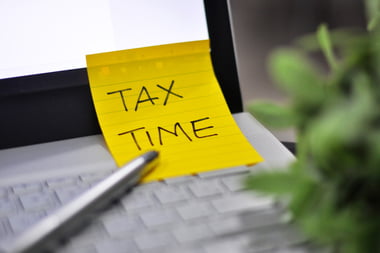Your recordkeeping system should include a summary of every transaction that takes place in your business’ name. Make sure you maintain and update a summary of all business transactions.
How to log and track your business tax records

Allocate space in your business books, accounting journals and ledgers for your gross income, deductions and credits. Also, remember that your business checking account serves as the primary resource when adding entries to your books. If you ever forget to log a transaction, just look at the records documented by the bank where you opened your business banking account.
Should you use accounting software to maintain business tax records?
If you already use accounting software to organize your business tax records, then you can continue to do so. Accounting software is trustworthy, and you can rely on it to adhere to basic recordkeeping principles. However, if you are concerned about any facet of your business tax records, you may want to refer to the IRS’ Publication 583, Starting a Business and Keeping Records.
Other ways to maintain healthy habits for business tax records
When practicing healthy business habits, it is essential that you maintain a record of your supporting documents, from sales slips and paid bills to invoices and receipts. Even deposit slips and canceled checks fall into this category. That’s because all of these contain information that you must keep records of in your books as well as on your tax return.
Make sure you keep them in an orderly and safe place for preservation purposes. It also doesn’t hurt if you organize these documents based on the year and type of income or expense they pertain to.
Which business records should you keep?
You should keep the following types of business records:
- Gross receipts.
- Purchases.
- Expenses.
- Assets.
- Employment taxes.
Now let’s take a closer look at each of these business record categories and what they entail.
Gross receipts
One type of business tax record that you must keep is referred to as gross receipts. It essentially refers to documentation that indicates income received by your business in exchange for products or services. This category of business records includes cash register tapes, cash sales, credit card sales, invoices, receipt books, and Form 1099-MISC documents for each person who did work for you in any given tax year.
Purchases
Any products that you buy and resell to your customers are considered purchases. For manufacturers and producers alike, purchases include the cost of all raw materials or parts that you buy with the intention of turning them into finished products.
Your supporting documents should identify who the payee was, how much you paid, the date of the payment, and a detailed description explaining the item’s intended use. This information will prove that the amount of money you spent was put toward business-related purchases.
Expenses
This category of business tax records refers to all of the costs that you accrue within business-related matters. When documenting your expenses, make note of how much you paid, whom you paid, and when you paid the expense. Also, describe what you paid for and include proof of payment to back up your claims.
Assets
An asset refers to any form of property that you both own and make use of as part of your business endeavors. Make sure you maintain records of your assets, and ensure that you have detailed information on record regarding your business assets.
This data will make it easier for you to compute the annual depreciation as well as the gain or loss of the asset when the time comes to sell it. Documents for assets should indicate when and how you acquired your business assets. Maintain records of the purchase price, the cost of any improvements, depreciation-related deductions, and other details regarding how you acquired —and how you used or plan to use — the asset.
Employment taxes
This category of business tax records entails information regarding your employees. It’s required that employers hold on to employment tax records for a minimum of four years. For more insight into what the IRS expects of you as an employer regarding employment taxes, you can reference the IRS’ Recordkeeping for Employers and Publication 15, Circular E, Employer’s Tax Guide.
Now that you understand what business tax records are and how you can keep accurate records of them, you’ll feel more equipped as a business owner — especially when tax season rolls around. If you have any questions or concerns about filing taxes for your business, don’t hesitate to hire a tax professional or seek guidance from advisers who have experience in your industry.
